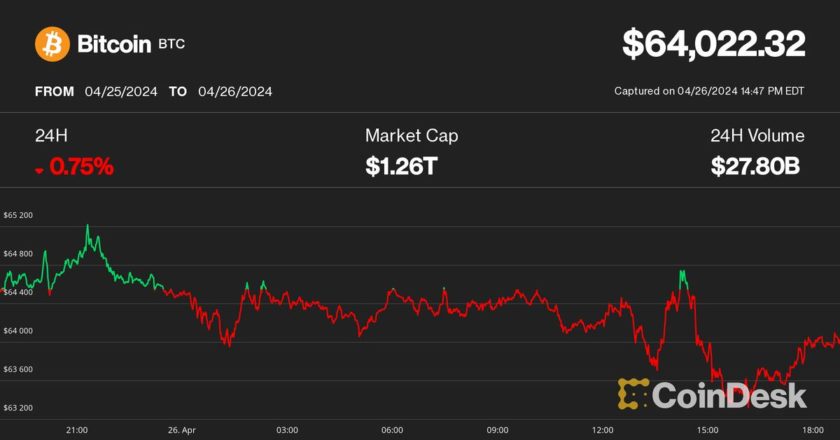Bitcoin, North Korea, and the Gini Coefficient–Who Wants What Nouriel Roubini Is Smoking?
October 9, 2018 by Paul de Havilland
Honing in on the proximity of bitcoin’s Gini coefficient to North Korea’s, Nouriel Roubini doubled down on his scathing criticism of crypto and blockchain at the Ahead of the Curve Speaker Series in New York a few days ago at The Assemblage John Street hotel.
Also see: Andreas Hassman on tezos.blue: The ‘Showcase App’ for Tezos Building
Subscribe to the Bitsonline YouTube channel for great videos featuring industry insiders & experts
Nouriel Roubini–Doctor of Economics, Former White House Advisor, and Master of the Soundbite
The seething, but very entertaining, Dr. Roubini was in rare form at the Ahead of the Curve Speaker Series on October 4th. With a timely reminder of the ICO frenzy the cryptocurrency community appears to be slowly recovering from, Roubini reminded the audience that:
“81 percent of all ICOs were a scam to begin with. 11 percent of them are dead or dying.”
Tokenization, outside of the scams and failures, Roubini argued, is a form of returning to a system of barter:
“Even the Flinstones, they had the Flinstone Dollar… So even the Flinstones were more advanced in avoiding barter than this world of tokenization.”
Crypto/Blockchain: Biggest Scam of Our Time or Last Best Hope?
We’re live at The Assemblage John Street with the next round in our Ahead of the Curve series presented by Jim Clark. Tonight: economist Nouriel Roubini and Omega One CEO Alex Gordon-Brander will explore and debate the future, or lack thereof, of blockchain.Get your questions ready, post them in the comments, and we’ll ask the panel their honest opinions.
Posted by The Assemblage on Thursday, October 4, 2018
Not Even Blockchain Is Spared a Spray
Roubini raised the question of why, if blockchain technology was intended to be decentralized, permissionless, and public is it spurning new models that are centralized, permissioned, and private for use internally by and/or between corporations. To Roubini, they are “nothing more than a glorified Excel spreadsheet”. But as Paul Puey of Edge Wallet argues, decentralization itself is not the end goal of the technology.
Speaking of the various fintech advancements over the past decade, from Wechat in China, to Stripe, Venmo, and Square, Roubini failed to see a place in the ecosystem for blockchain technology:
“Blockchain is the most over-hyped technology in human history.”
Roubini Saves His Best for Decentralization and Inequality
Roubini has referred to bitcoin’s disastrously inequitable distribution in the past, with a Gini coefficient measuring 0.88. The Gini coefficient, or index, is a measure of income or wealth dispersion among a population, and the most commonly used statistical tool to measure inequality. Zero is perfect equality and one is perfect inequality. (Though it is often represented as a number between zero and a hundred, the lower the more equitable.)
While statistics vary between the World Bank, the OECD, and the CIA World Factbook, the U.S. has a Gini coefficient, according to Dr. Roubini, of around 0.5. Europe’s coefficient is 0.35. North Korea’s is 0.86. Bitcoin and Ethereum have Gini coefficients around 0.88. In other words, crypto is less equitably spread than wealth in arguably the least equitable country in the world.
Decentralization in crypto is a myth. It is a system more centralized than North Korea: miners are centralized, exchanges are centralized, developers are centralized dictators (Buterin is “dictator for life” ) & the Gini inequality coefficient of bitcoin is worse than North Korea
— Nouriel Roubini (@Nouriel) October 8, 2018
At the Speaker Series, the professor of economics at New York University’s Stern School of Business and notorious cryptagonist lashed out at crypto’s inequality, claiming bitcoin has achieved the “highest concentration of wealth in human history”.
Roubini’s problems are numerous here. Firstly, there is not a clear relationship between bitcoin owners, wallets, and addresses. There are many people with more than one wallet and more than one address. Similarly, it is unclear if Roubini has excluded exchange addresses from his calculations–as these can be one address with lots of bitcoin shared by thousands of people.
An excellent analysis of bitcoin inequality on Medium suggests that “the richest 30% of all Bitcoin owners own 98.3% of all Bitcoins. So the poorest 70% of Bitcoin owners own less than 1.7% of all Bitcoin”.
Everyone else has no bitcoin at all. But were bitcoin to become the standard currency of use overnight, those without it would simply buy it with fiat and its Gini coefficient would improve dramatically. There would still be a one percent problem, but fiat is hardly immune to that.
BitInfoCharts shows that wallets exceeding 100 BTC represent 62 percent of all bitcoin. Those exceeding ten bitcoin represent over 87 percent of all coins. A look at the top addresses, however, does reveal the top five belong to exchanges.
Is the Gini Coefficient Being Misapplied Here?
Equality of ownership is a poor way to judge many things, nascent technology included. The Satoshi whitepaper is not even a decade old, so the fact that bitcoin has failed to spread equitably or widely is hardly surprising. This is even more apparent when one considers crypto still faces legal uncertainty in most of the world.
Companies such as Square are working on ways to bring crypto closer to the POS, but merchant acceptance remains incredibly low. Crypto is not something everybody needs, like fiat or oxygen, to survive. Tuberculosis, which affects ten million people around the world, has a Gini coefficient of 1. Ten million people have it, and everybody else doesn’t. But inequality isn’t the first problem that comes to mind when one thinks about TB. It’s certainly not a reason to try to prevent it.
Nouriel Roubini decries cryptocurrency as “the mother and father of all asset bubbles” and denies it has any place in our monetary system. To him, it is not fit to be a currency. Yet one of his most colorful arguments against it is an argument suited only to a discussion about currencies.
It appears to me Roubini cannot criticize crypto on the basis of the inequality of its distribution on the one hand, and argue it takes us back to the age of bartering–pre-currency–on the other. The professor’s criticism of blockchain technology suffers from the same problem. As a decentralized, permissionless, public ledger it is impractical for those seeking transaction privacy and control. But when it evolves into hybrid permissioned-permissionless, public-private forms, he calls it a glorified spreadsheet.
Even Roubinomics has its limitations.
Have your say. Do you find logical problems with Nouriel Roubini’s stance?
Images via Pixabay




